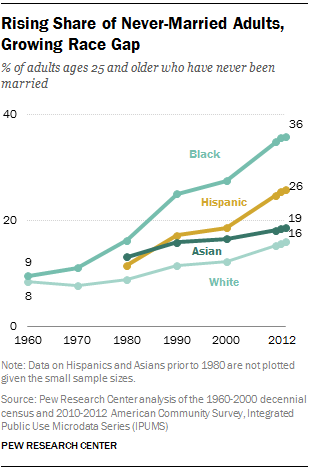 The Pew Research Center says today that the number of Americans who have never married is at an all-time high.
The Pew Research Center says today that the number of Americans who have never married is at an all-time high.
In 2012, one in every 5 Americans over 25 isn’t and never has been married. For men, it’s close to one in every four.
Shifting public attitudes and hard economic times are credited for the decline in the institution, according to Pew.
Opinions on this issue differ sharply by age—with young adults much more likely than older adults to say society is just as well off if people have priorities other than marriage and children. Fully two-thirds of those ages 18 to 29 (67%) express this viewpoint, as do 53% of those ages 30 to 49. Among those ages 50 and older, most (55%) say society is better off if people make it a priority to get married and have children.
Despite these mixed views about the role of marriage in society, most Americans (68%) continue to believe it is important for couples to marry if they plan to spend the rest of their lives together. Roughly half of all adults (47%) believe that this is very important, and an additional 21% consider it somewhat important.
While blacks are more likely than whites to have never been married (and less likely to be currently married), a much higher share of blacks (58%) than whites (44%) say that it’s very important for a couple to marry if they plan to spend their lives together.
There’s another factor, however. Men and women don’t want the same things in a partner.
Among the never married, men and women are looking for distinctly different qualities in a potential mate. Never-married women place a great deal of importance on finding someone who has a steady job—fully 78% say this would be very important to them in choosing a spouse or partner. For never-married men, someone who shares their ideas about raising children is more important in choosing a spouse than someone who has a steady job.
Never-married adults—whether male or female—place a much lower priority on finding a partner who shares their moral and religious beliefs, has a similar educational pedigree or comes from the same racial or ethnic background.
The New York Times says the survey could reshape policies surrounding taxes, children, and entitlements.
